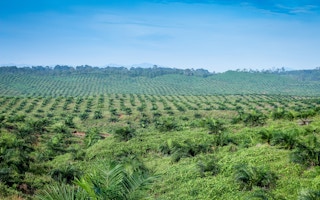Indonesia’s second largest palm oil producer Astra Agro Lestari has joined the ranks of the industry’s most proactive sustainability advocates signing onto the Indonesian Palm Oil Pledge (IPOP) less than a year after it was singled out by environment groups for rampant deforestation and human rights violations.
To continue reading, subscribe to Eco‑Business.
There's something for everyone. We offer a range of subscription plans.
- Access our stories and receive our Insights Weekly newsletter with the free EB Member plan.
- Unlock unlimited access to our content and archive with EB Circle.
- Publish your content with EB Premium.
The company, also known as Astra, on Monday formally became part of the group of palm oil giants committed to producing the commodity without deforestation, as well as enhancing the welfare of workers and improving Indonesia’s market competitiveness.
The IPOP initiative, launched at the United Nations Climate Summit in September 2014, is a commitment by the world’s major palm oil growers to stop all deforestation within their supply chain, promote better livelihoods for smallholders, and make sure Indonesia’s palm oil is economically competitive in a global marketplace.
Besides Astra, other signatories to IPOP, include fellow Indonesian firm Asian Agri; Singapore-based Golden Agri Resources, Wilmar, and Musim Mas; and American agribusiness giant Cargill. The initiatve is also backed by the Indonesian Chamber of Commerce (KADIN).
Astra’s move to join IPOP was welcomed as a “huge breakthrough” by green groups, who noted that the palm oil giant can now use its clout in the sector to back calls for laws which support forest conservation and community rights.
The company has in recent years faced heavy criticism from environmentalists not only because of rampant deforestation in its supply chain, but because its director Joko Supriyono, who also heads the Indonesian Palm Oil Grower’s Association (GAPKI), has previously advocated for weakening forest protection laws rather than strengthening them.
Deborah Lapidus, spokesperson for Center for International Policy - one of the groups which negotiated outcomes with Astra as it was developing its sustainability policy last year - said that “Astra joining IPOP is an important signal that it is ready to use its power for good”.
Annisa Rahmawati, forest campaigner, Greenpeace Indonesia, added that Supriyono should now “use his chairmanship of GAPKI to set a constructive 2016 agenda for the whole industry to work to protect forests and peatlands to prevent a repeat of last year’s fires crisis.”
Forest and peatland fires raged in Indonesia during the second half of last year, blanketing parts of Southeast Asia in a choking haze. The palm oil industry, along with the pulp and paper industry, was blamed for much of this burning.
Astra’s poor environmental record was the subject of a high-profile public campaign last May, led by anti-deforestation group Forest Heroes. They targeted luxury hotel chain Mandarin Oriental, which shares a parent company with the palm oil grower.
Both firms are owned by Bermuda-incorporated Jardine Matheson group, which is publicly listed in Singapore and London. Protesters picketed outside Mandarin Oriental hotels around the world and launched an online petition calling for Jardine Matheson to stop Astra’s environmental destruction.
Less than a month after the campaign kicked off, Astra promised to stop deforestation in its supply chain and also said it would join IPOP. It reiterated this promise when it launched its sustainability policy last September.
By joining the pledge, Astra has agreed to stop developing on peatland and forest areas considered to have a high carbon stock.
It must also provide technical help and social services to the smallholders in its supply chain to improve welfare and crop yields, and work with KADIN and the Indonesian government to support policies for sustainable palm oil cultivation.
Many of the IPOP clauses are already reflected in Astra’s recently launched sustainability policy, in which the company promised to stop developing in areas with peat, or high carbon stock and conservation value and ban the use of fire to clear land.
It also pledged to respect the human rights of the smallholders in its supply chain as well as its plantation workers, and to obtain free, prior and informed consent from rural communities before converting any new land to plantations.
The other IPOP signatories have in recent years unveiled similar sustainability policies promising no deforestation, no peatland development, and no exploitation of workers or communities.
Last October, media reports said the Indonesian government was asking IPOP participants to exempt smallholders from their zero-deforestation pledges out of concern for their livelihoods. In response, IPOP has promised to balance forest protection with protecting smallholders and keeping Indonesian palm oil economically competitive.
According to the pledge, the key to achieving this is building a partnership with multiple stakeholders including communities, farmers, and the government.
Anja Lillegraven, head of Southeast Asia and Oceania division, Rainforest Foundation Norway, noted that IPOP is just the type of public-private collaboration needed to avoid future forest fires and another haze crisis.
“Joining together also makes it easier and more cost-effective for Astra and other companies to engage in landscape-level restoration efforts that begin to reverse some of the harm that has been done in the past,” she added.










